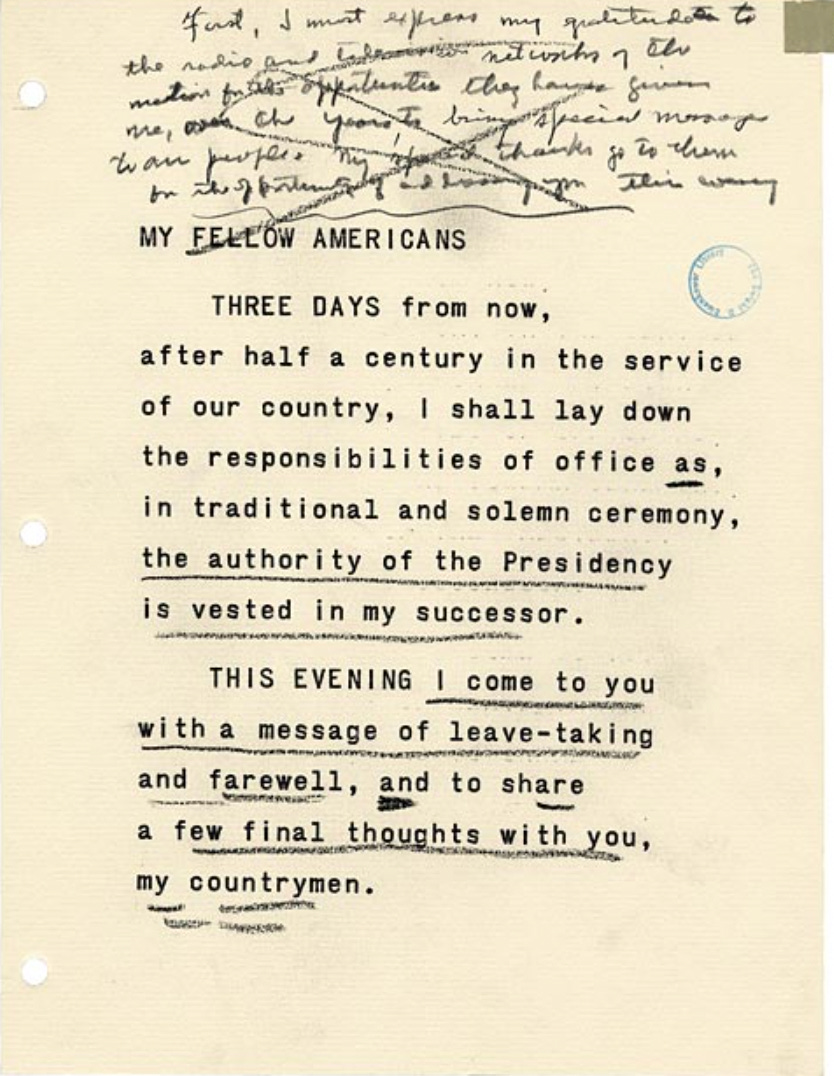Download speech here.
When President Dwight D. Eisenhower addressed the nation in January 1961, he not only bid farewell after eight years in office but left behind a warning that has echoed through American history. In his speech, he introduced the term “military-industrial complex,” a phrase that would come to embody the complicated and increasingly influential relationship between the United States' military, its political institutions, and the powerful network of defense contractors and technological industries shaping the nation's defense apparatus. Eisenhower was deeply familiar with the necessity of military readiness; as a five-star general who had commanded Allied forces in World War II, he had witnessed the profound stakes of maintaining a strong defense in an era of global tension and shifting alliances. However, as president, he saw the expansion of defense institutions in a different light, and what he observed filled him with concern. While he acknowledged the military-industrial complex as a “necessary evil” in the face of the Cold War’s relentless pressures, he cautioned that this very apparatus could become a threat to the democratic principles it was designed to protect.
Eisenhower’s speech was rooted in his growing realization of the vast influence and inertia of the military sector and its allied industries. Over the course of his presidency, the United States had cultivated a defense network so expansive that it began reshaping the economic and political landscape. Large defense budgets and military contracts became central to the prosperity of entire towns, regions, and industries, and the military’s dependency on private companies led to powerful interests lobbying for more defense spending and influence over policy decisions. In this way, Eisenhower warned, the military-industrial complex possessed the potential to become a "permanent armaments industry," one that operated with its own goals and agenda that could sometimes diverge from the public’s best interest. He worried that an unchecked military-industrial influence could skew the priorities of government away from its fundamental responsibility to citizens and toward policies that favored the defense sector, diminishing the people’s control over their own democratic institutions.
Eisenhower’s remarks went even further, touching upon the parallel rise of a “scientific-technological elite.” This elite, emerging from the rapid advancements in science and technology during the 20th century, included not just defense contractors but researchers, technologists, and engineers whose innovations were reshaping everything from weaponry to global communications. With new discoveries and advancements flooding into every aspect of American life, Eisenhower saw the potential for science and technology to greatly enrich society; yet he feared the risk of these powerful interests overshadowing democratic decision-making. His concern was that if these elites dominated national policies, they might pursue goals that prioritized technological or financial gains over ethical considerations, societal welfare, or even global peace. He understood that in a nation increasingly driven by innovation and scientific progress, a narrow group wielding such power could come to exercise considerable influence over decisions that would shape the future of democracy and individual freedoms.
At the heart of Eisenhower’s message was a call for a balanced approach to national security. He recognized that the Cold War justified a certain level of military preparedness and strategic planning. However, he warned that such an approach must not override the fundamental ideals upon which the United States was founded. In his view, maintaining a balance between security and liberty was a delicate task that demanded constant vigilance from both the government and the public. Eisenhower saw that a nation singularly focused on militarization and technological supremacy would risk losing the human freedoms that distinguished democracy from authoritarian regimes. His words—“We must never let the weight of this combination endanger our liberties or democratic processes”—highlighted his vision for a society that remained rooted in its democratic values, even as it addressed the complex realities of an unpredictable global landscape.
Eisenhower’s farewell address was not a mere critique of his time but a farsighted analysis that remains relevant in today’s world. In an era when the defense budget of the United States exceeds the combined military spending of several other leading nations, the influence of defense contractors, lobbying firms, and technology giants can seem as formidable as ever. This dynamic has arguably entrenched a new breed of military-industrial complex, with multinational corporations and cybersecurity firms playing a critical role in shaping policies on warfare, data security, and international relations. As technological advancements like artificial intelligence, drone warfare, and cyber capabilities redefine the parameters of national security, Eisenhower’s cautionary note against allowing a technological elite to dominate policy resonates with even greater urgency. He foresaw a world where short-term technological gains might be prioritized over ethical, social, and long-term considerations, compromising individual freedoms and societal welfare in pursuit of profit or expedient solutions.
Reflecting on Eisenhower's address today, it is clear that his concerns were not isolated to the Cold War era but anticipated broader trends that would define the latter half of the 20th century and the early 21st. His caution against the overreach of military and technological elites was, at its core, a plea for responsible governance that placed democratic principles above profit or power. In his final address, he urged Americans to remain vigilant, to be informed and engaged citizens who would not allow any one sector—military, corporate, or scientific—to wield unchecked power. Eisenhower’s legacy in this regard is one of both insight and foresight, a reminder that the strength of a democracy lies not only in its ability to defend itself from external threats but in its commitment to protect and prioritize the rights and freedoms of its people above all else. His words continue to serve as a beacon, illuminating the challenges of balancing security with liberty, and remind us of the importance of ensuring that technological and military advancements serve not only national security but the broader, enduring ideals of democracy.
Eisenhower’s warnings about the military-industrial complex and the rise of a scientific-technological elite have, in many respects, become manifest in the decades since his 1961 farewell address. His concerns about the potential for unchecked influence by powerful defense and technology sectors on government policy have grown increasingly prescient as both industries have embedded themselves more deeply in American politics, economics, and society. Although the context and specifics of these sectors have evolved—particularly with technological advancements and shifting global threats—the dynamics Eisenhower described remain strikingly relevant, revealing his speech as more prophecy than farewell.
The military-industrial complex has grown substantially since Eisenhower's presidency. The defense budget, then at a height justified by the Cold War, has consistently remained among the largest in the world, outstripping the combined defense spending of several major global powers. This continuous growth has entrenched a powerful defense network composed of contractors, lobbyists, and federal agencies, collectively shaping not only military policy but also broader government priorities. Defense contractors such as Lockheed Martin, Raytheon, and Boeing wield significant influence through political donations, lobbying, and employment networks, and the symbiosis Eisenhower warned against between government and defense contractors has often led to policy decisions prioritizing the needs of these firms over other pressing issues. This alignment has, for instance, seen the U.S. engage in prolonged military campaigns, such as those in Afghanistan and Iraq, with unclear objectives and ambiguous outcomes but substantial financial benefits for the defense sector.
Moreover, as Eisenhower feared, the military-industrial complex has grown beyond a purely defensive infrastructure. With new security concerns such as cyber warfare, counterterrorism, and artificial intelligence, the definition of “defense” has expanded to include technological surveillance and cyber intelligence, often blurring the lines between national security and personal privacy. The rise of mass surveillance programs, particularly following the September 11, 2001 attacks, underscores this concern. Programs spearheaded by the National Security Agency (NSA) and supported by private contractors have conducted broad data collection efforts that critics argue infringe upon individual privacy rights, marking a shift towards an overreaching surveillance state. These actions, ostensibly to ensure national security, echo Eisenhower’s caution that the pursuit of security could erode personal liberties.
Eisenhower’s additional warning about the influence of a scientific-technological elite has likewise materialized, though perhaps in ways he could not have fully anticipated. The growth of Silicon Valley has fostered a new class of technological giants—companies like Google, Facebook (now Meta), Apple, and Amazon—that wield unprecedented economic and political power. These corporations play a central role in the digital infrastructure of modern society, controlling vast amounts of personal data and influencing global communications, commerce, and even political outcomes. Technology companies have embedded themselves in American policy-making, contributing to an environment where government and tech interests often align. This has raised concerns about their influence on everything from information dissemination to national security, with the U.S. government frequently collaborating with or even deferring to these corporations on matters of cybersecurity, data privacy, and artificial intelligence.
The emergence of this scientific-technological elite has underscored another of Eisenhower's concerns: that technological priorities might override ethical considerations and democratic processes. The advent of social media platforms and data-driven algorithms has had profound implications for societal values, influencing public opinion, elections, and even mental health. Recent revelations about how these platforms use algorithms to maximize engagement, sometimes at the expense of truth and public well-being, illustrate a form of technological determinism that Eisenhower warned against. These platforms operate with minimal oversight or regulation, leaving critical decisions about information dissemination, content moderation, and privacy in the hands of a few corporations. Their dominance has raised urgent questions about accountability, with some critics suggesting that they operate with powers more akin to those of a governmental body than a private entity.
In a broader sense, Eisenhower’s call for “balance” in pursuing security and technological advancement remains profoundly relevant as the United States grapples with the challenges of rapid technological development and national security demands. The post-9/11 era saw an escalation of government surveillance and a significant erosion of privacy rights through legislation such as the Patriot Act. And today, as new security threats emerge, such as cyber warfare and AI-driven weaponry, the balance between protecting civil liberties and securing the nation is once again in question. These developments evoke Eisenhower’s warning that unchecked power concentrated in the hands of a few could lead to policy choices that prioritize expedience and control over democratic ideals and freedoms.
In sum, Eisenhower’s foresight has, over time, proven eerily accurate, as the modern United States navigates the complexities of a vastly powerful military-industrial sector and the influence of technology giants with global reach. His farewell address was more than a warning—it was a framework for understanding the interplay of security, democracy, and individual freedom. Today, his message underscores the importance of an engaged citizenry and vigilant leadership willing to confront these issues in a way that respects democratic principles and public accountability. As America continues to grapple with issues of security, technological power, and democratic values, Eisenhower’s words serve as a critical reminder of the enduring need for a government that balances strength with restraint and innovation with ethical responsibility.
















Share this post